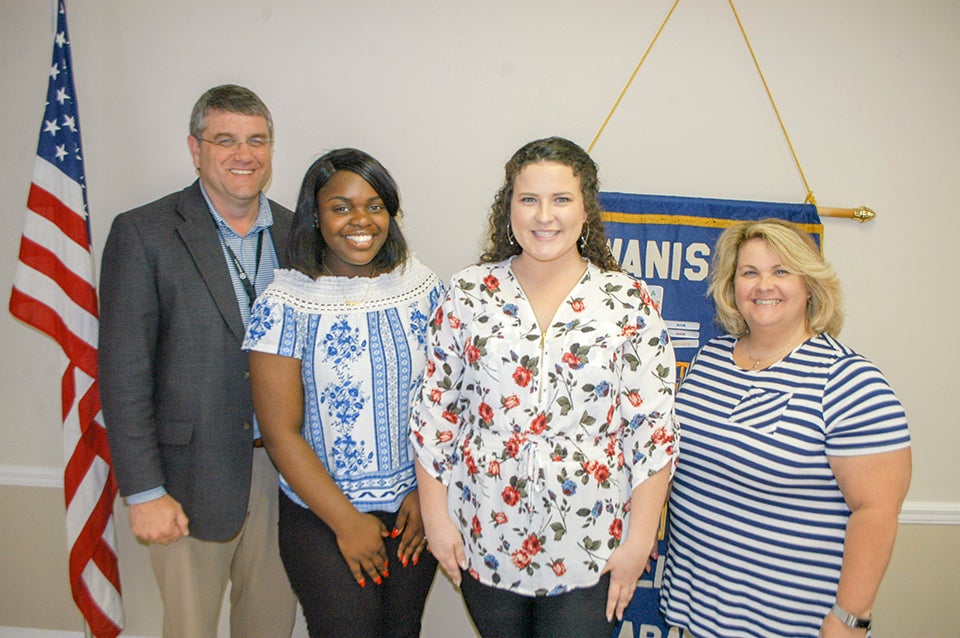Career Tech students prepared for workforce
Published 6:00 pm Wednesday, May 1, 2019

- Valley High seniors Salicia McLaurin-Bethea and Kayleigh Burdette, second and third from left, spoke about their experience in becoming certified nursing assistants at Wednesday’s noon hour meeting at the Kiwanis Club of Valley. Also pictured is Ken Sealy, far left, director of the Chambers County Career Technical Center and Nancy Warren Holland, far right, the club president.
VALLEY — During the noon hour on Wednesday, members of the Kiwanis Club of Valley were shown how today’s high school student can be given a head start on a career through programs being offered through the Chambers County Career Technical Center. CTC Director Ken Sealy said that he was extremely proud of the students in its Certified Nursing Assistant (CNA) program.
Since Southern Union State Community College is collaborating with the CTC in a dual enrollment program, high school students can get college credit while being certified as a CNA.
With there being strong demand for certified personnel in any health-related field, these high school seniors are in line to get good jobs before they’ve gotten their high school diploma.
Sealy said that seven students had been enrolled in the program. All of them were well prepared for their state-administered CNA exam. All of them passed and have CNA certification, and two of them spoke at the meeting.
Kayleigh Burdette said she started taking courses at Career Tech last year when she was a junior.
“I learned all the basics of the human body,” she said. “I also got the opportunity to explore the hospital through clinicals.”
EAMC-Lanier offers health science students the chance to get some actual experience in a hospital setting. Kayleigh said that this had changed her career goal from that of being a radiology tech to being an emergency room nurse.She said the CNA course had been an amazing experience for her.
“The class has seven girls in it, with five of us dual enrolled at Southern Union,” she said. “On April 11, we took our CNA test, and all of us passed.”
The CNA course allows the students to practice and learn 23 hands-on skills.
“All of the CNAs at EAMC-Lanier were very helpful,” she said. “They took time out of their day to give us pointers on how we could be better. During clinicals in the nursing home, we got to assist them with feeding the residents, making their beds and getting them ready for their day. Working with the residents created a bond I will never forget.”
Kayleigh is the president of the Valley High HOSA organization and vice president of the school’s National Technical Honor Society.
Salicia McLaurin-Bethea is vice-president of HOSA and president of the VHS National Technical Honor Society.
Like Kayleigh, McLaurin-Bethea has been taking foundation programs in the CTC’s health sciences curriculum for the past two years. Taking these courses, she said, convinced her on a future career.
“Before I started taking the classes, I had always wanted to work in the health care field,” McLaurin-Bethea said. “My choice now is to work in physical therapy/sports medicine field.”
She said the hands-on experiences she’s had have really helped her.
“When you build a bond with a patient, you feel wonderful inside,” McLaurin-Bethea said.
The downside is getting close to a patient and then losing them.
“It takes a strong person to do this,” she said. “We’ve been able to work up close with doctors, nurses and patients. It has prepared me for what it will be like when I actually start working. We’ve been able to take care of sick patients, such as charting their symptoms, preparing them for surgery, watching a radiologist perform an MRI and watching a physical therapist exercise a patient.”
Salicia said the CNA class had been eye opening for her.
“I’ve learned a lot,” she said. “We’ve learned 23 skills, including feeding, bathing, lifting and so on. We’ve had the opportunity to perform all of these skills on real patients. Of course, there’s a certified nurse there to assist us.”
Sealy said that being a CNA is a great way to get involved in the healthcare field. Many CNAs have gone on to become registered nurses and some have become doctors.
“It’s an entry level position,” he said.
“It gets them in a hospital or nursing home, and they can get tuition help to move on. EAMC-Lanier has been wonderful to work with, and we’d love to keep that relationship going. There is always work in this area for CNAs.”
It takes 30-plus classroom hours and 76 clinical hours to complete the program. Passing the state test allows for the certification needed to get employment.




